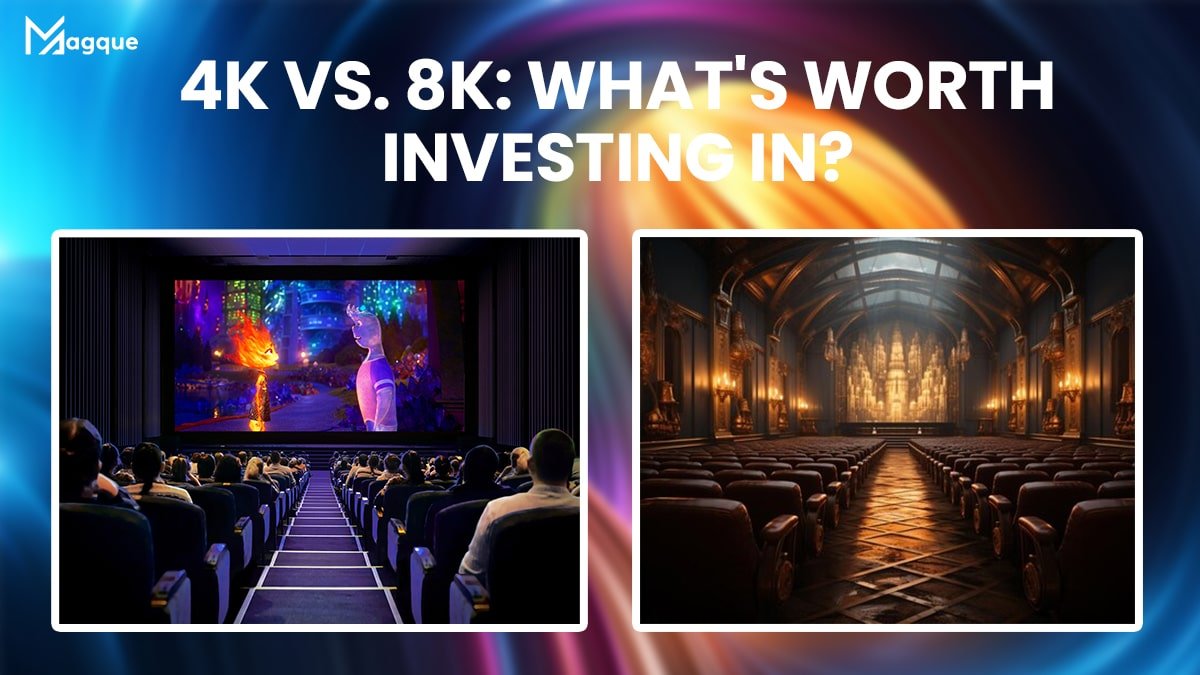Hey there! Are you caught up in the resolution race, trying to figure out whether 4K or 8K is the real deal? Well, you’re not alone. With technology evolving faster than ever, choosing the proper resolution for viewing pleasure can feel like navigating a maze of pixels. But fear not; we’re here to illuminate this high-definition dilemma.
Understanding the Basics: What Exactly Are 4K and 8K?
Let’s start with the basics. 4K and 8K refer to the number of horizontal pixels in a display resolution. 4K boasts a resolution of 3840 x 2160 pixels, while 8K takes up a notch with a whopping 7680 x 4320 pixels. Simply put, 8K offers four times the number of pixels as 4K, promising ultra-crisp images and unparalleled clarity.
The Battle of Picture Quality: Is 8K Worth the Hype?
Now, you might wonder, is 8K worth the hype? Well, picture this: you’re watching your favorite blockbuster film in 8K, and every detail pops with vivid precision, from the subtlest expressions to the grandest landscapes. It’s like seeing the world through a pristine window, with colors that leap off the screen and immerse you in the action.
The Cost Conundrum: Balancing Quality and Budget
Of course, with excellent resolution comes a more significant price tag. 8K TVs are significantly more expensive than their 4K counterparts, making them a hefty investment for the average consumer. So, is the splurge worth it? It ultimately depends on your priorities. If you’re a cinephile or a tech enthusiast who craves the latest and greatest, 8K might be worth the investment for its unparalleled viewing experience.
Future-Proofing Your Entertainment Setup
Regarding future-proofing your entertainment setup, 8K has undeniable appeal. As content creators continue to push the boundaries of visual storytelling, 8K provides a canvas for their creativity to flourish. Plus, with streaming services and gaming consoles gradually embracing 8K content, investing in this cutting-edge technology ensures you’ll stay ahead of the curve for years.
Making Your Decision: Which Resolution Is Right for You?
So, what’s the verdict? Should you stick with trusty old 4K or leap into the dazzling world of 8K? Ultimately, the decision concerns your preferences, viewing habits, and budget constraints. 4K offers a fantastic viewing experience at a more accessible price point, while 8K delivers unparalleled clarity and future-proofing potential for the tech-savvy consumer.
In the end, whether you opt for 4K or 8K, one thing’s for sure: you’ll be treated to an incredible visual feast that brings your favorite content to life like never before.
Stay Tuned for More Tech Talk
That wraps up our dive into the 4K vs. 8K resolution world. We hope this guide has helped demystify the debate and empowered you to make informed decisions about your entertainment setup. Stay tuned for more tech tips, trends, and reviews from Magque!
FAQs
Q1. What exactly is the difference between 4K and 8K?
In simple terms, 4K resolution refers to a display with approximately 4,000 horizontal pixels, while 8K resolution boasts around 8,000 horizontal pixels. This means that 8K provides four times the detail and clarity of 4K, leading to sharper images and more immersive viewing experiences.
Q2. Are there noticeable differences in picture quality between 4K and 8K?
Absolutely! While both resolutions offer high-definition viewing, the difference in picture quality between 4K and 8K can be significant. 8K resolution provides finer details, smoother edges, and richer colors, resulting in a more lifelike and immersive visual experience than 4K.
Q3. Do I need an 8K TV to enjoy 8K content?
Yes, you do. To fully appreciate the benefits of 8K resolution, you’ll need a compatible 8K television or display device. While some 8K content may be downscaled to fit on a 4K screen, you won’t experience the full extent of 8K’s clarity and detail without a dedicated 8K display.
Q4. Is there enough 8K content available to justify the investment?
While the availability of 8K content is still relatively limited compared to 4K, the landscape is gradually changing. Streaming services, content creators, and even some broadcasters are starting to produce and distribute content in 8K resolution. Additionally, advancements in upscaling technology can enhance the visual quality of lower-resolution content on 8K displays.
Q5. What factors should I consider when deciding between 4K and 8K?
Several factors come into play when choosing between 4K and 8K, including your budget, viewing distance, content preferences, and future-proofing considerations. While 8K offers unparalleled clarity and future-proofing potential, 4K provides an excellent viewing experience at a more affordable price. Ultimately, the decision depends on your personal preferences and priorities.
Read Also This – The Future of 4K and 8K TVs













